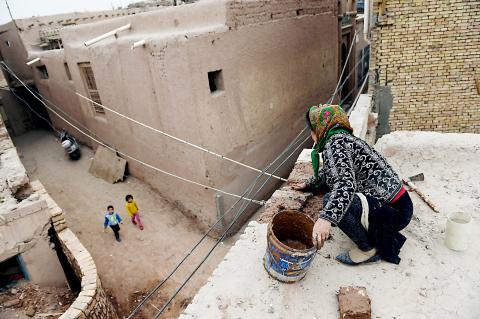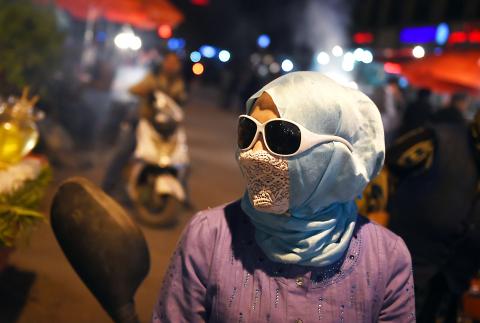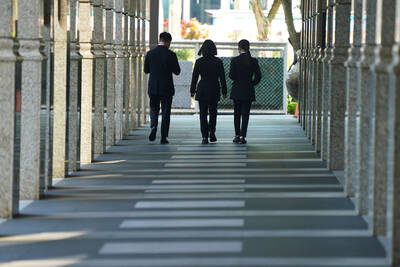The Silk Road trading center of Kashgar has been Muslim for centuries, but despite hordes of people thronging the main bazaar, Gulnur’s headscarf shop had barely any customers.
As violence increased last year in China’s far western region of Xinjiang, home to mostly Muslim Uighurs, authorities banned veils and other Islamic coverings — wreaking havoc on her business.
“We’re all branded as terrorists because of a few bad people,” said Gulnur, who is Uighur. “The Chinese don’t understand that we’re not all the same.

Photo: AFP
“Regulations like this will only alienate people,” she added.
It is an example of the challenges Beijing faces pacifying the region, where Uighurs accuse the Chinese government of discrimination and restrictions on language, culture and religion.
Xinjiang shares a border with Afghanistan and Pakistan and is culturally closer to Central Asia than China’s Han heartland.

Photo: AFP
Authorities blame the violence — which has increased in intensity and spread beyond the region in recent years, with more than 200 people killed in 2014 — on Islamist separatists.
In the past year many forms of Islamic dress have been banned and beards ruled out for young and middle-aged men as Beijing works to root out what it calls “religious extremism.”
Posters throughout the region list the prohibited “five abnormal appearances”: face veils, burqas, young women in tight headscarves, the beard restrictions and any clothing with a crescent moon and star logo akin to the Turkish flag.
One propaganda image shows a woman in her 30s with a simple head covering looking in a mirror and seeing a smiling face, while a veiled female is confronted with a skeleton on fire.
Taxis throughout the region are not allowed to pick up customers wearing banned items. The city of Karamay has barred them from public transport, and Turpan has stopped burqa sales.
At a bazaar in Hotan, Patigul showed off what was once her most popular item: a 15 yuan (US$2.40) white lace veil covering the bottom half of a woman’s face and held in place by surgical mask-style straps.
“The government has been discouraging wearing veils for years, but we never expected a complete ban and it’s hurt business,” she said. “We weren’t prepared, and suddenly couldn’t sell about half our inventory.”
BEARDED BEAUTY
A man from Kashgar was jailed for six years in March for growing a beard and his burqa-wearing wife sentenced to two years in prison, reports said.
Beijing — which says it has brought Xinjiang development and higher living standards — insists that more conservative forms of dress are foreign imports from the Middle East and not part of Uighur culture.
Face veils represent a “cultural reverse,” Zeng Cun, the Communist Party secretary of Kashgar reportedly said in March. “We have to take strides forward as a secular, modern country,” he added. France and Belgium have enacted similar bans on veils, provoking widespread debate unseen in China. But a traditional Uighur saying declares: “The beauty of language is in its expressions, the beauty of a man is in his beard,” and analysts say the Xinjiang measures risk backfiring.
“There is clearly a stronger emphasis now among Uighurs on maintaining the religion and practicing Islam as the state insists on ruling what is culturally acceptable,” said David Brophy, a professor at the University of Sydney and Uighur expert.
“Islam is a central part of people’s identity as Uighurs.”
In cities across Xinjiang, Uighurs and Han Chinese residents live almost entirely separately, with a heavy security presence in places frequented by Han and tourists. In some places the very fabric of Uighur city life has fallen victim to government regulations.
At 40, Abdul Resli has been a traditional builder for more than half his life and has 20 men working for him in Kashgar’s old city.
But the area has been largely demolished and rebuilt in government-mandated redevelopment over the last decade, putting artisan brickmakers out of business and leaving him fewer homes to work on.
Authorities say the works are to improve safety standards, but Abdul says earthen brick walls have stood for 500 years. “I can’t trust the quality” of newer bricks, he says. “But it’s what I’ve been told to use.”
‘A LOT OF HASSLE’
Officials across Xinjiang declined to discuss the ban on Islamic clothing or its effects on small businesses when contacted by AFP.
The increase in violence has also hurt businesses itself, with tourist numbers down nearly 5 percent last year and the Xinjiang government acknowledging that “influence from terrorist attacks” was a factor. Eminjan, a seller of traditional knives with a thick mustache, said most of his business dried up after a group of Uighurs stabbed 31 people to death at a train station in Kunming in March last year.
Like many interviewed for this story, he preferred to identified by only one name for fear of government reprisals.
“These knives are not illegal, and they’re a part of Uighur history,” he said. “But if the police search you and find one, especially for young men, it will bring you a lot of hassle. So people don’t buy them because it’s not worth the trouble.”

JUNE 30 to JULY 6 After being routed by the Japanese in the bloody battle of Baguashan (八卦山), Hsu Hsiang (徐驤) and a handful of surviving Hakka fighters sped toward Tainan. There, he would meet with Liu Yung-fu (劉永福), leader of the Black Flag Army who had assumed control of the resisting Republic of Formosa after its president and vice-president fled to China. Hsu, who had been fighting non-stop for over two months from Taoyuan to Changhua, was reportedly injured and exhausted. As the story goes, Liu advised that Hsu take shelter in China to recover and regroup, but Hsu steadfastly

Taiwan’s politics is mystifying to many foreign observers. Gosh, that is strange, considering just how logical and straightforward it all is. Let us take a step back and review. Thanks to the Chinese Nationalist Party (KMT) and the Taiwan People’s Party (TPP), starting this year people will once again have Christmas Day off work. In 2002, the Scrooges in the Democratic Progressive Party (DPP) said “bah, humbug” to that. The holiday is not actually Christmas, but rather Constitution Day, celebrating the enactment of the Constitution of the Republic of China (ROC) on December 25, 1947. The DPP and the then pan-blue dominated legislature

Focus Taiwan reported last week that government figures showed unemployment in Taiwan is at historic lows: “The local unemployment rate fell 0.02 percentage points from a month earlier to 3.30 percent in May, the lowest level for the month in 25 years.” Historical lows in joblessness occurred earlier this year as well. The context? Labor shortages. The National Development Council (NDC) expects that Taiwan will be short 400,000 workers by 2030, now just five years away. The depth of the labor crisis is masked by the hundreds of thousands of migrant workers which the economy absolutely depends on, and the

If you’ve lately been feeling that the “Jurassic Park” franchise has jumped an even more ancient creature — the shark — hold off any thoughts of extinction. Judging from the latest entry, there’s still life in this old dino series. Jurassic World Rebirth captures the awe and majesty of the overgrown lizards that’s been lacking for so many of the movies, which became just an endless cat-and-mouse in the dark between scared humans against T-Rexes or raptors. Jurassic World Rebirth lets in the daylight. Credit goes to screenwriter David Koepp, who penned the original Jurassic Park, and director Gareth Edwards, who knows